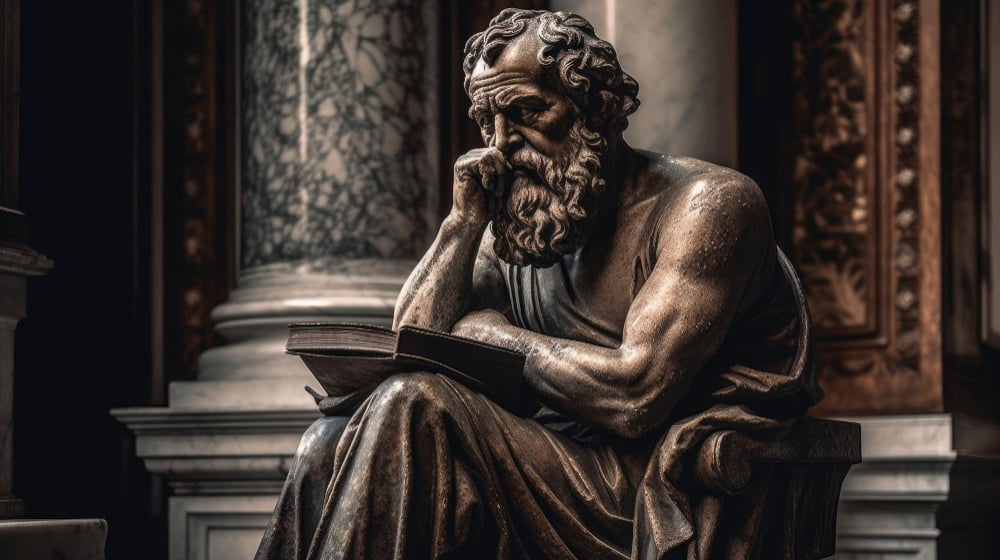Stoicism is a philosophical movement that originated in ancient Greece and was founded by Zeno of Citium during the Hellenistic period. It was later developed by philosophers such as Cleanthes, Chrysippus, Seneca, Epictetus, and Marcus Aurelius. Stoicism is distinguished by its emphasis on virtue, reason, and self-control in the face of life's challenges.

Acceptance of Virtue as the Highest Good: Stoicism teaches that virtue (personal excellence) is the highest good, and it believes that virtuous behavior leads to a meaningful life.
Acceptance of Nature: Stoics advocate living in harmony with nature. This involves accepting the natural order of the universe, understanding what is within our control, and accepting what is not.
Apathy (Not to be confused with modern usage): Stoicism encourages emotional resilience and self-control. It teaches individuals not to be indifferent to external circumstances and to be unaffected by pleasure or pain, success or failure.
Dichotomy of Control: Stoic philosopher Epictetus emphasized the distinction between things within our control (thoughts, actions, and attitudes) and those beyond our control (external events, others' actions). According to Stoicism, a wise person focuses on what is within their control and accepts the rest equally.
Mindfulness and Attention to the Present Moment: Stoicism advises individuals to be aware of the present moment, focus on current tasks, avoid excessive preoccupation with the past, and not worry excessively about the future.
Social Virtue: Stoicism emphasizes the importance of social relationships and encourages individuals to be kind, fair, and just towards others.
Internal Control and External Conditions: Stoics stress that our internal states, thoughts, and reactions are within our control, while external events or the actions of others are not entirely within our control. They seek inner peace by focusing on internal states and accepting external conditions.
Fate and Acceptance: Stoics counsel acceptance of fate and the natural order. Instead of resisting events beyond our control, Stoics advise understanding and embracing them as a key to inner peace.
Moral Responsibility: Stoicism underscores moral values and virtue. Personal development is pursued through fulfilling moral responsibilities and leading a virtuous life.
Exercise and Practice: Stoics value exercises and practices that apply philosophical principles to daily life. This ensures that the teachings are not merely theoretical but are adopted on a practical level.
Service to Others: Stoicism encourages fair and benevolent treatment of others in social relationships. Demonstrating tolerance, patience, and love towards others is considered a part of Stoic values.
These principles form the foundational structure of Stoicism. While each Stoic philosopher may have nuanced differences in their teachings, they generally revolve around the themes of virtue, moral responsibility, acceptance, and inner peace.

Cleanthes: Cleanthes, Antik Yunan Stoacı filozoflardan biridir. M.Ö. 331-M.Ö. 232 yılları arasında yaşamıştır. Stoacılık okulunun ikinci lideridir ve Zeno'nun öğrencisi olarak Stoacılığı benimsemiştir. Cleanthes, evrendeki düzenin ve tanrının varlığını vurgulayan bir Stoacı olarak bilinir. Tanrısal düzenin bir parçası olarak insanın doğal düzenle uyum içinde yaşamasını savunmuştur.
Chrysippus: Chrysippus, Antik Yunan Stoacı filozoflardan biridir ve Stoacılık okulunun en önemli figürlerinden biridir. M.Ö. 279-M.Ö. 206 yılları arasında yaşamıştır. Mantık, epistemoloji ve etik konularında önemli katkılarda bulunarak Stoacılığı daha tutarlı ve sistemli bir felsefi sistem haline getirmeye çalışmıştır.
Seneca: Seneca, Roma İmparatorluğu'nun önemli bir Stoacı filozofudur. M.S. 4-M.S. 65 yılları arasında yaşamıştır. Seneca, Stoacı prensipleri günlük yaşama uygulamada vurgu yaparak içsel huzurunun temelinin erdem ve ahlaki doğrulukta olduğuna inanmıştır. Hem devlet adamı hem de yazar olarak tanınmıştır.
Epictetus: Epictetus, Antik Yunan Stoacı filozoflarından biridir ve M.S. 50-M.S. 135 yılları arasında yaşamıştır. Köle olarak doğmasına rağmen, öğretileriyle özgürlüğün asıl kaynağının içsel erdemde olduğunu öğretmiştir. "Kontrolümüzde olanlar ve olmayanlar" ayrımıyla, insanların yaşam olaylarına nasıl yaklaşması gerektiğini vurgulamıştır.
Marcus Aurelius: Marcus Aurelius, Roma İmparatoru ve Stoacı filozoftur. M.S. 121-M.S. 180 yılları arasında yaşamıştır. "Meditations" adlı eseri, kendi içsel düşüncelerini içeren bir günlük niteliğindedir. Stoacı prensipleri savaş zamanı liderliği ve günlük sorumluluklarına nasıl uyguladığına dair değerli bir bakış sunar. İmparatorluk döneminde Stoacılık prensiplerini savunmuş ve kişisel yaşamında bu prensiplere sadık kalmıştır.

Stoicism identifies four cardinal virtues that serve as foundational principles for leading a virtuous and fulfilling life:
Wisdom (Practical Reason): This virtue involves the ability to make sound decisions based on practical reasoning, understanding the nature of events, and adapting to circumstances with thoughtful judgment.
Courage (Fortitude): Stoic courage is not just physical bravery but also the mental strength to face adversity, endure hardships, and confront fears with resilience. It encourages individuals to stand firm in their convictions.
Justice: The virtue of justice in Stoicism revolves around treating others fairly, with kindness, and respecting their inherent worth. It emphasizes acting in accordance with moral and social principles to foster harmonious relationships.
Temperance (Self-Discipline): Stoic self-discipline involves exercising moderation and restraint in one's actions and desires. It emphasizes control over impulses and desires, leading to a balanced and harmonious life.
These virtues form the ethical framework of Stoicism, guiding individuals toward a life of virtue, personal excellence, and inner peace.
What is the Stoic philosophy in simple terms?
What is Stoic mindset?
Do Stoics believe in God?